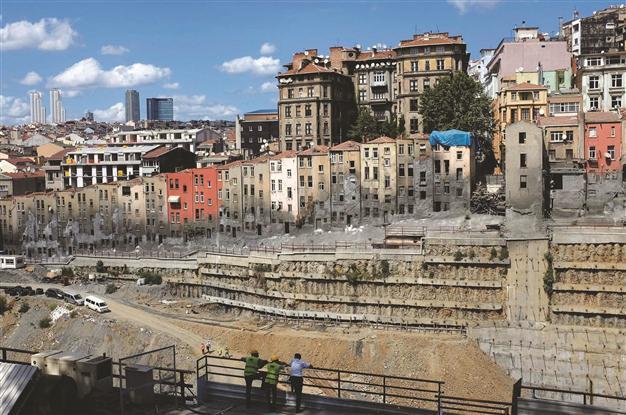Turkey’s rebellious chamber to attend meetings abroad only with permission from ministry
Erdinç Çelikkan ANKARA

The redevelopment plan in Tarlabaşı, located right next to the centric Taksim area, is one of the urban project legally challenged by TMMOB. REUTERS Photo
The Union of Chambers of Turkish Engineers and Architects (TMMOB) will need to ask for written permission from the Environment and Urbanization Ministry to attend symposiums, congresses and association meetings held abroad, according to a communiqué released in the Official Gazette on Dec. 24.The “Communiqué regarding the administrative and financial inspection of the TMMOB and related chambers” prepared by the Environment and Urbanization Ministry and released in the Official Gazette states that TMMOB needs to apply to the ministry to get permission for representatives of the union to attend events that take place abroad.
The administrative and financial audit of TMMOB will also be conducted by the ministry’s Guidance and Inspection Directorate, which will do the inspections on denunciations and complaints.
TMMOB has become well-known for opening lawsuits against controversial construction projects across the country and thus drawing reactions from the government.
In a written statement issued on Dec. 25, the environment ministry states they have released the communique under a law that granted them the right to do so, adding that asking for written permission to attend events abroad was a judicial obligation.
TMMOB Head Mehmet Soğancı told Hürriyet that they would not be able to attend meetings in a foreign country if the ministry does not grant them permission.
“They are making TMMOB be like a public office. TMMOB members have duties in the high-level management of international engineering and architecture committees. Sometimes they attend meetings every week. To the TMMOB, this equates to censorship; they want to block us, but they cannot be such enemies. TMMOB has become the government’s phobia,” said Soğancı, adding that they would pursue all judicial processes in this issue.
The communiqué came about two weeks after the news that the government was working on a draft bill that would end the autonomy of the TMMOB. All regulations prepared by the TMMOB will not enter into force before advice and approval is received from the Environment and Urbanization Ministry, according to the bill. The TMMOB will also lose its public institutional structure and will no longer have the authority to file lawsuits against construction projects.
The ministry introduced the bill two years ago, but it was canceled after harsh reactions against the moves. The new regulations on the structure of the TMMOB have been included in the Construction Draft bill.
According to the bill, the TMMOB will be obliged to submit any new regulations to the ministry within six months, and the ministry will have the authority to extend this period for a maximum of a further six-months. Changes that are not approved by the ministry within this period will automatically become invalid.
















